About the Author
Patrick D. Murphy, professor of English at the University of Central Florida, is the author of Farther Afield in the Study of Nature Oriented Literature and Literature, Nature, and Other: Ecofeminist Critiques; editor or coeditor of various ecocritical books including The Literature of Nature: An International Source-book and Ecofeminist Literary Criticism and Pedagogy; and founding editor of ISLE: Interdisciplinary Studies in Literature and Environment. His recent essays include The Varieties of Environmental Literature in North America, Whose Planet Is It, Anyway? Environmentalism and Science Fiction, and Subjects, Identities, Bodies, and Selves: Siblings, Symbiotes, and the Ecological Stakes of Self-Perception.
Ecocritical Explorations in Literary and Cultural Studies
LEXINGTON BOOKS
A division of Rowman & Littlefield Publishers, Inc.
A wholly owned subsidiary of The Rowman & Littlefield Publishing Group, Inc.
4501 Forbes Boulevard, Suite 200
Lanham, MD 20706
Estover Road
Plymouth PL6 7PY
United Kingdom
Copyright 2009 by Lexington Books
First paperback edition 2010
Excerpts from pages 73 and 141 of The Woman Who Married a Bear and from pages 110 and 117 of The Curious Eat Themselves, copyright 1992, 1993, respectively, courtesy of Soho Press, Inc. All rights reserved.
Excerpts from Gary Snyder copyright 2000 by Gary Snyder from The Gary Snyder Reader: Prose, Poetry, and Translations. Reprinted by permission of Counterpoint.
All rights reserved. No part of this publication may be reproduced, stored in a retrieval system, or transmitted in any form or by any means, electronic, mechanical, photocopying, recording, or otherwise, without the prior permission of the publisher.
British Library Cataloguing in Publication Information Available
Library of Congress Cataloging-in-Publication Data
The hardback edition of this book was previously cataloged by the Library of Congress as follows:
Murphy, Patrick D., 1951
Ecocritical explorations in literary and cultural studies : fences, boundaries, and fields / Patrick D. Murphy.
p. cm.
Includes bibliographical references and index.
1. American literatureHistory and criticism. 2. Ecocriticism. 3. Ecology in literature. 4. Philosophy of nature in literature. I. Title.
PS169.E25M87 2009
810.9'355dc22 2008055644
ISBN: 978-0-7391-3173-2 (cloth : alk. paper)
ISBN: 978-0-7391-3174-9 (pbk. : alk. paper)
ISBN: 978-0-7391-3175-6 (electronic)
Printed in the United States of America
 The paper used in this publication meets the minimum requirements of American National Standard for Information SciencesPermanence of Paper for Printed Library Materials, ANSI/NISO Z39.481992.
The paper used in this publication meets the minimum requirements of American National Standard for Information SciencesPermanence of Paper for Printed Library Materials, ANSI/NISO Z39.481992.
Preface
This volume represents the culmination of five years of ecocritical explorations picking up, after a brief hiatus as a department chair, where I left off in Farther Afield in the Study of Nature-Oriented Literature and continuing to reflect some of the same concerns first elaborated in Literature, Nature, and Other. Like those books, this one contains attention to theoretical and conceptual issues, in particular referentiality and the non-alibi of being. It also includes attention to issues of genre, specifically in terms of the appearance of, and potential for, ecocritical and nature-oriented content in the genre of the novel and the popular subgenres of mystery and science fiction. In the latter few chapters I intensify the cultural studies dimension of my concerns treating fathers, disasters, and hurricanes, a coincidental but perhaps not entirely gratuitous grouping. And, in addition to referencing the classroom in various chapters, I conclude with a discussion of some of the kinds of courses that I have taught with a nature-oriented or environmental justice component or with a focus on nature-oriented literature.
These widely ranging explorations stem from a unified set of concerns and ethical pivots. Every individuals actions matter and count. The United States is rapidly moving toward what are now being referred to in the media as tipping points. Moments of crises are fraught with dangers and with potential. Promoting nature-oriented literature cannot afford to be a disengaged form of intellectual recreation. Rather, it can and must contribute to larger cultural swirls, intellectual trends, and popular dialogues. My concerns with referentiality and the non-alibi certainly develop out of that belief and the belief that literature, defined as loosely and broadly as possible, can both reflect and contribute to cultural opinions and changes in perception.
At the same time, the moment of crisiswhat James Howard Kunstler calls the long emergency and Richard Heinberg labels the century of declineswill extend over decades and the exposure to a particular idea about destructive human behavior, ecosystem health, what-if scenario about nature nurturing alternatives, or visions of the worlds future can produce results years after an individual has first encountered the idea, image, allegory, or analogy. For that reason, I have sought to include attention here both to quite timely issues, such as hurricanes and the human intensification of natural disasters, and more long range ones, such as alternatives to the nation-state. Also, some of the ideas and approaches to environmental issues in literature and in community activism are limited, slightly off the mark, and occasionally completely wrongheaded. Therefore, the encouraging of people to read, study, critique, and teach texts, movements, and cultural characteristics must include setting the works in dialogue with each other and setting the readers in dialogue with the works. With that recognition and in the spirit of dialogue, I invite readers to take up this book and enter into a discussion with the ideas presented here.
In the first section, Climbing through Conceptual Fences I focus on theoretical issues. The introduction situates ecocritical theory in terms of referentiality and a nonfoundational orientation relying on nonfiction for its literary examples. I emphasize that with referentiality comes responsibility and the need for both diversity in method and diversity in intellectual resources. Chapter 1 takes the concept of referentiality as its starting point to discuss how theory can help articulate both what people are already doing and what they ought to be doing from an ecocritical perspective. Here I look specifically at the issue of simplicity as depicted in literary nonfiction devoted both to retreats from urban society and specific lifetime economic commitments. Chapter 2 extends the theoretical discussions initiated in chapter 1 by taking up issues in ecopolitical critical theory and integrating them by means of literary representations of alternatives to the modern nation-state, both in terms of significations (concepts) and referentialities (practices). Unlike the first two chapters, which relied on literary nonfiction, this chapter mixes fiction and nonfiction, especially written by poets, to demonstrate the theoretical argument.
In the third chapter, I move from the terrain of the nation-state to the real and virtual terrains to be traversed by tomorrows college students, an area hotly debated in ecocritical and educational fields. The chapter begins with a look at students intermodal reading practices, their increasing distances from physical terrains and increasing proximity to virtual terrains making use of observations of the experience of my at-the-time fifteen-year-old daughter. I then consider the potential for gaming-shaped responsiveness and digital literacy to contribute to heightened environmental consciousness, particularly in relation to a contingency-based approach to problem solving. Literary examples are drawn from contemporary fiction, including popular genres. In chapter 4 I turn from the broad scope of the previous essays to consider how ecocritics can develop a transnational ecocritical theory, one that cuts across national literatures and cultural gestalts to synthesize an evolving theory adequate to the literary and cultural concerns ecocritics are trying to address. The ability to develop such a theory is demonstrated through a detailed survey of the published writings of an individual thinker, Professor Hwa Yol Jung of Moravian College. In the course of this review the theoretical issues are explored through reference to a multicultural collection of contemporary American fiction and nonfiction.


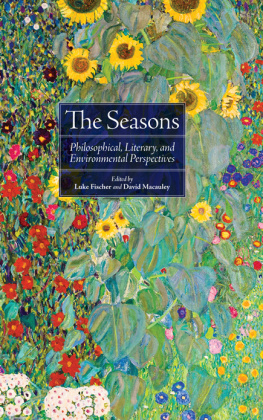
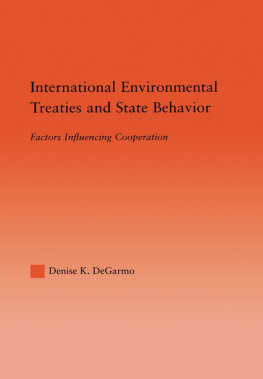
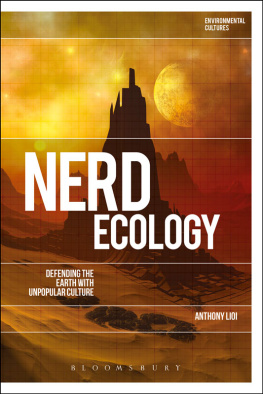
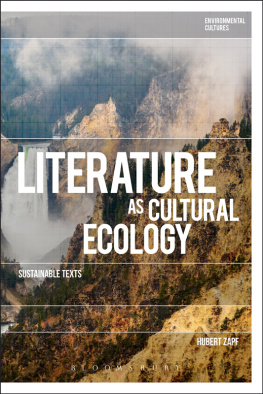
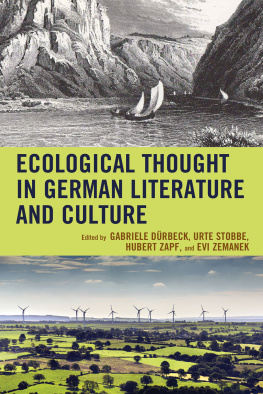
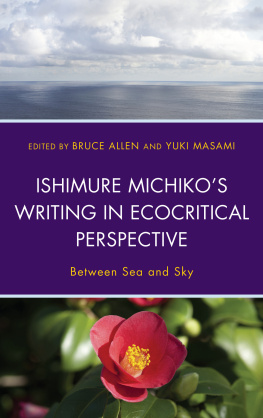
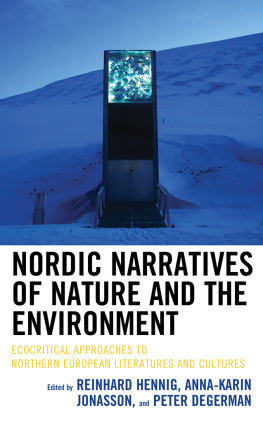
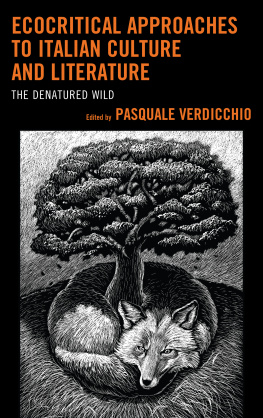
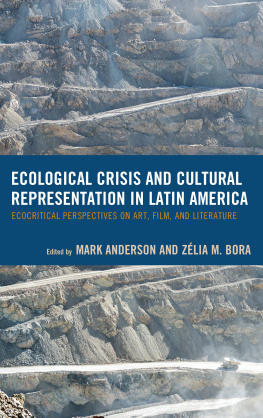

 The paper used in this publication meets the minimum requirements of American National Standard for Information SciencesPermanence of Paper for Printed Library Materials, ANSI/NISO Z39.481992.
The paper used in this publication meets the minimum requirements of American National Standard for Information SciencesPermanence of Paper for Printed Library Materials, ANSI/NISO Z39.481992.